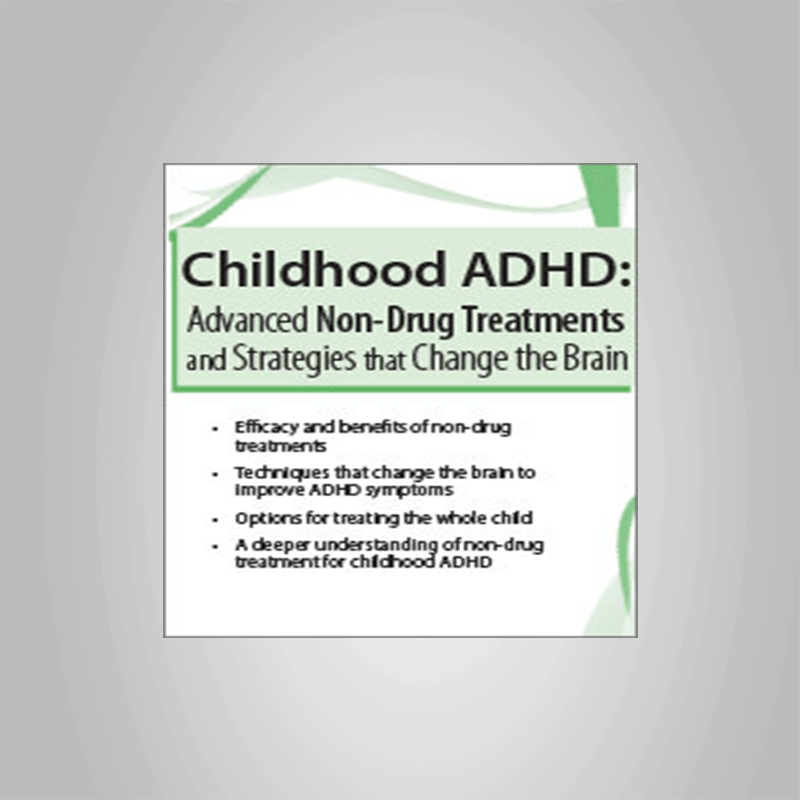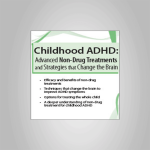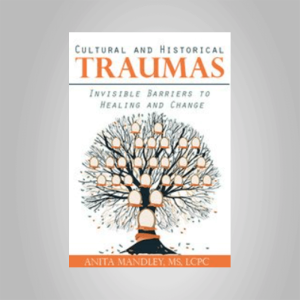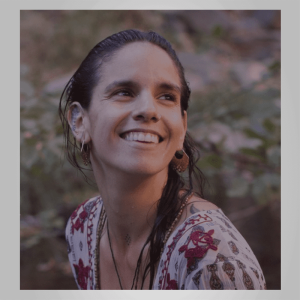Debra Burdick – Childhood ADHD: Advanced Non-Drug Treatments & Strategies that Change the BrainDescriptionEfficacy and benefits of non-drug treatmentsTechniques that change the brain to improve ADHD symptomsOptions for treating the whole childA deeper understanding of non-drug treatment for childhood ADHDAlthough medication has been the traditional first line of treatment for childhood ADHD, there are many kids and teens for whom medication is not the best option. You will learn when to consider and how to incorporate non-drug options into your treatment plan. The more you understand about the non-drug treatments for ADHD the more comprehensive, individualized and effective your treatment will be.Learn about cutting edge non-drug treatments for ADHD as well as the efficacy and neurobiology of each treatment. Finally understand what neurofeedback is, how it works, and why the American Academy of Pediatrics added biofeedback/neurofeedback to its list of best treatment modalities for ADHD. You will learn and practice brain-based mindfulness skills that help kids and teens slow down, calm down, concentrate, and feel better about themselves. Master skills for helping kids, teens, and their parents make ADHD-specific changes in their diet, sleep, behavior, organization, exercise, and environment that support their success. Options for addressing low self-esteem, depression, and anxiety that so often accompany ADHD will also be discussed.Debra Burdick, LCSWR, BCN, a psychotherapist, neurotherapist, author and ADHD and mindfulness expert will show you how to put all the pieces together and give you new skills that will improve your treatment outcomes for working with clients with ADHD. The recording will include case examples, experiential learning, tools for tracking treatment progress and a wealth of worksheets and resource materials to use with your clients.HandoutsManual (4 MB) 125 Pages Available after PurchaseOutlineStrategies to Make an Accurate DiagnosisReview of the DSM-5® CriteriaTools for Diagnosis: Structured Interview, Symptom Checklists, TOVA, IVA, QEEG, Neuropsych TestingRecognize Contributors to (or mimics of )Symptoms of ADHDNeurobiology of ADHDTypes of ADHDCo-morbid DisordersCutting Edge Non-Drug Treatment OptionsPsychotherapy and/or CoachingWhat Works and What Doesn’t for ADHDSelf-esteem, Depression, AnxietyNeurofeedbackEfficacy for NeurofeedbackTreatment ProcessCase ExamplesSample SystemsMindfulness for Kids and Teens with ADHDResearch on Effectiveness for ADHDNeurobiologySkills to teach your clients for:Concentration, Hyperactivity, Self-esteem, Movement, Depression, AnxietyCase ExamplesReview of Complimentary TherapiesInteractive Metronome®Sensory Integration TherapyNutrition for the ADHD BrainSugarFood additivesFood AllergiesCommon DeficienciesSupplementsOrganic?The Role of Exercise and Movement on the Brain and ADHDSleepThe Impact of ADHDStrategies for RegulatingStrategies to Improve Behavior and RelationshipsBehavior ManagementSocial SkillsOrganizational SkillsSite of Performance Skills and SystemsSystems for Organizing Time, Space and ActivityEnvironmentScreen TimeToxinsStrategies for Success at SchoolPPT, IEP, AccommodationsStudy StrategiesTrack Treatment ProgressFacultyDebra Burdick, LCSW, BCNDebra Burdick, LCSW, BCN, also known as ‘The Brain Lady’, is a Licensed Clinical Social Worker and a board certified neurofeedback practitioner. Debra is an international speaker and author of the best-selling books, Mindfulness Skills Workbook for Clinicians and Clients: 111 Tools, Techniques, Activities & Worksheets (PESI, 2013), Mindfulness Skills for Kids & Teens: A Workbook for Clinicians & Clients with 154 Tools, Techniques, Activities and Worksheets (PESI, 2014), ADHD: Non-Medication Treatments and Skills for Children and Teens (PESI, 2015) and Mindfulness Skills for Kids: Card Deck and 3 Card Games (PESI, 2017). She has taught mindfulness skills to her clients for over 25 years.She recently retired from her private practice, and previously worked at the Child Guidance Clinic, Family Services, Child and Family Agency, and Lawrence and Memorial Hospital.Debra incorporates mindfulness skills in all areas of her practice. She initially became interested in mindfulness to deal with a chronic illness (now thankfully healed). She found it so helpful in her own life that she started teaching her clients the skills she was using. She went on to develop clinical material on mindfulness skills and created a four-step process for working with clients using mindfulness that she perfected in her private practice and in an intensive outpatient program. Her clients have shown her that mindfulness skills improve the rate and quality of treatment outcomes.Debra has presented numerous presentations, workshops, and teleseminars. She is often interviewed on Internet radio and telesummits and her work has been featured in The Day newspaper, Self-Improvement Magazine, and “Parenting Powers†television show.Speaker Disclosures:Financial: Debra Burdick maintains a private practice. She is an author for Vervante publishers and receives royalties. She receives a speaking honorarium from PESI, Inc.Nonfinancial: Debra Burdick contributes to SelfGrowth.com and receives no compensation.
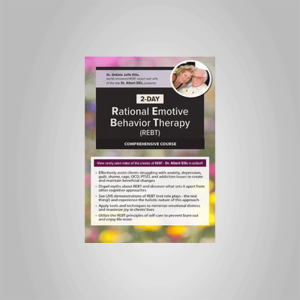 Debbie Joffe Ellis – 2-Day Rational Emotive Behavior Therapy (REBT) Comprehensive Course
₹11,454.00
Debbie Joffe Ellis – 2-Day Rational Emotive Behavior Therapy (REBT) Comprehensive Course
₹11,454.00
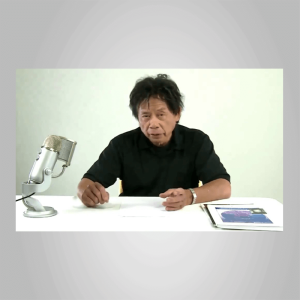 Dr. Kam Yuen D.C – The Yuen Method Workshop Modules 1-3
₹16,102.00
Dr. Kam Yuen D.C – The Yuen Method Workshop Modules 1-3
₹16,102.00
Debra Burdick – Childhood ADHD: Advanced Non-Drug Treatments & Strategies that Change the Brain
₹5,810.00

